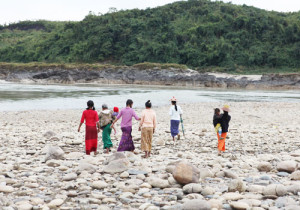by Vani Sathisan and Sean Bain*
“The scale and severity of human rights violations in Kachin State is one of the worst in Myanmar,” a lawyer told the International Commission of Jurists during a meeting in Myitkyina last month.

Visitors walk along the riverbank at the Myitsone in Kachin State in December 2015. (Wa Lone / The Myanmar Times)
Illegal large-scale land grabbing, harassment of landowners by government and business officials, and a lack of access to justice were the central complaints heard by the ICJ during the discussions with human rights defenders and civil society groups in Kachin State.
Senior state-level judicial officials signalled increased readiness to discuss ways to improve the effectiveness and independence of the courts. Yet meaningful reform also requires revising laws to bring them in line with international human rights standards, respecting judicial independence by government officials, and securing corporate legal compliance through consistent application of the law and access to fair and effective judicial review.
The conflict in Kachin State and northern Shan State, where over 100,000 people remain displaced since fighting between the government and ethnic armed groups re-started in 2011, is partly fuelled by the abundant natural resources.
Eighty percent of Myanmar’s mining operations are located in Kachin State and neighbouring Sagaing Region. Timber, rubies and gold are plentiful. A report by international watchdog Global Witness estimated the value of illegal jade mining at around US$31 billion in 2014 alone. Yet hazardous mining practises are rampant while law enforcement is haphazard. Continue reading
